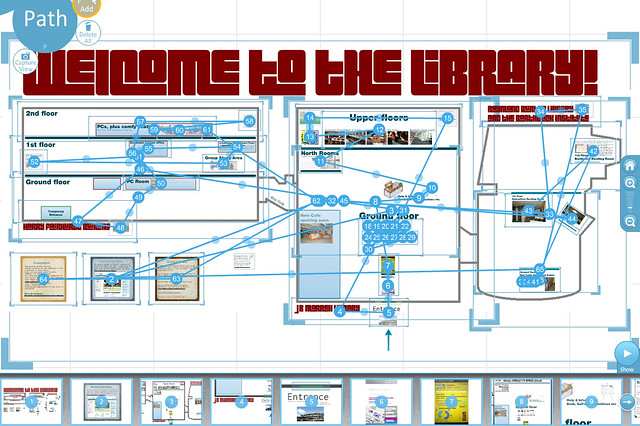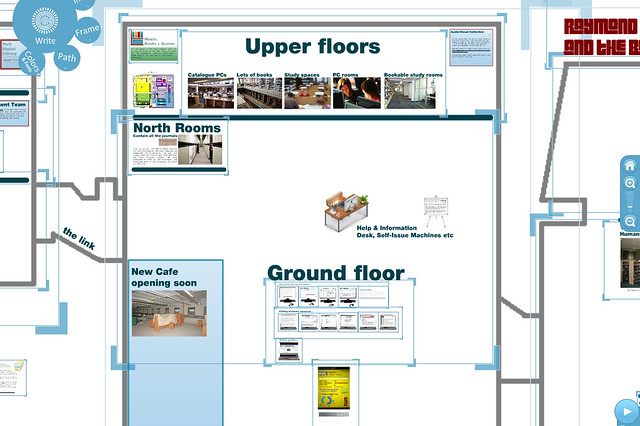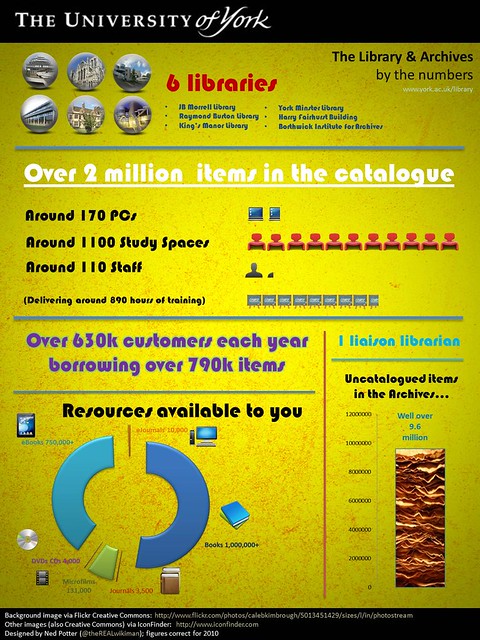 I was pleased to catch up with Steven Bell, Associate University Librarian for Research and Instructional Services at Temple University and the Association of College and Research Libraries vice-president/president-elect. Steven is an expert on academic librarianship, learning technologies, design thinking, user experience and library management. Steven blogs at Kept-Up Academic Librarian, ACRLog, and Designing Better Libraries, a blog about design thinking and library user experiences. His column "From the Bell Tower" appears weekly in Library Journal's Academic Newswire.
I was pleased to catch up with Steven Bell, Associate University Librarian for Research and Instructional Services at Temple University and the Association of College and Research Libraries vice-president/president-elect. Steven is an expert on academic librarianship, learning technologies, design thinking, user experience and library management. Steven blogs at Kept-Up Academic Librarian, ACRLog, and Designing Better Libraries, a blog about design thinking and library user experiences. His column "From the Bell Tower" appears weekly in Library Journal's Academic Newswire.
In the first of two segments, Steven shares some of his own strategies for keeping up with the key trends on the library landscape.
Mike: As you look at the academic landscape, what trends do you see that will have important implications for academic libraries and librarians?
Steven: Assessment is a critical focus for academic libraries today. Libraries make enormous investments in databases, monographs and journals that are needed for teaching and research and yet we continue to face significant resource challenges on a number of fronts. A range of economic challenges is putting a dampening effect on endowments, grants and gifts. Constraints on state funding have been a particular challenge for public institutions lately, such as in Pennsylvania where we were hit with a 20% cut in state funding for higher education. To maximize limited resources, there is pressure for institutions to be more productive, to focus on meeting user needs, and to quantify outcomes in terms of teaching, learning and research. Our institutions, and our libraries, need to demonstrate and provide evidence that students are graduating with the skills we claim they earn here – and that we are improving our graduation rates so that students end up with diplomas and knowledge for the workplace – not just the burden of debt.
There is also a challenge in terms of sustainability. How can a higher education system with 3,000 to 4,000 institutions continue to scale in this type of environment? New online, low cost institutions also present a challenge since many people do not care for traditional higher education and are looking to find an easier and more direct way to get their diploma and advance their career.
Technological change is happening at such a rapid pace that libraries need to be looking for disruptive innovations which are on the horizon. Think for a moment about the new Piazza service which allows students to talk together about the best way to complete a homework assignment. How could an academic library be part of such a service? Would the library want to be part of such a service? We need to be asking these questions.
Mike: In "From the Bell Tower" you have highlighted the importance of newly minted academic librarians making an effort to stay up to date with the changes that are occurring on the academic landscape. Why do you feel that this is so important?
Steven: Typically, academic librarians are reading Library Journal and American Libraries and many are following library blogs that they started reading early in their careers. They are also tracking key developments in the field through more in-depth academic library publications such as College and Research Libraries, College and Research Library News, and The Journal of Academic Librarianship. These sources are important to stay current on what is happening in libraries and the research domain, but I have long advocated that librarians move beyond core publications to gain an even deeper understanding and appreciation of what is happening in the broader academic environment.
In the larger scheme of things, it is critical for both new and more established academic librarians to develop their own personal e-strategy for keeping up. We need to cast a wide net to understand opportunities and challenges that are on the landscape. We must strive to anticipate impacts from challenges to state funding, shifts in technology, or the recent sale of Blackboard. By keeping up, academic librarians add value in new ways and increase their leadership role on campus. Even though they've recently graduated, new librarians are not exempt from this responsibility, and in that column I urged them to go beyond the literature of librarianship to explore the issues of the day confronting higher education.
I know that the demands on librarians continue to increase and that keeping up is not easy and can be very time consuming. Initially, I would suggest that you start with only 30 minutes per day if that is all the time that you can spare. Keep your commitment manageable and try to expand it over time.
Mike: What tools and technologies do you recommend for doing this successfully?
Steven: More than a decade ago, I created my Keeping Up web site which offers good information on tools and sources for staying up to date. It has a lot of good ideas to get started. I recommend beginning with RSS feeds and email alerts from web sources and then experimenting with web page change detection services.
Also, it is important to point out that libraries often overlook their own database services as a source of RSS feeds and email alerts. As an example, I do saved searches and alerts for "design thinking" and I get table of contents updates from many business and library publications. Alerts and RSS feeds from ProQuest and other information services consolidate updates from many sources and this can result in significant time savings.
Mike: What are the news sources that offer the most current, reliable, and insightful information on key academic library trends?
Steven: I also have created a blog to support librarians in following latest academic trends, The Kept Up Academic Librarian. In addition to subscribing to this blog, I recommend that librarians subscribe to updates from Inside Higher Education and The Chronicle of Higher Education to follow the latest developments in academia. ACRL and ARL are good sources of special reports relevant to academic libraries, such as the ACRL Environmental Scan and the Top Ten Trends reports. You won't miss these if you subscribe to the ACRL Insider newsletter.
I also recommend The New York Times Education, Business and Technology sections. Months ago, I learned in The New York Times about the social networking service for students helping students in doing their homework called Piazza. I had not heard of this emerging service anywhere else and it could have important implications for librarians who often play this role. Other good sources to surface this type of insight include University Business, Library Journal Academic Newswire, MIT InfoTech Updates (some content is fee-only), and Harvard Business Review Blogs.
Mike: What about Twitter, Facebook, Google+ and LinkedIn? How can academic librarians best use social media to keep up with the latest developments?
Steven: These sources are great in some ways but the amount of noise within these channels can be problematic. You need to limit yourself to following a handful of people within these communities. It is critical that they be people who have demonstrated ability to stick to the meaty stuff. You need to determine the noise level that you are willing to accept in exchange for an occasional timely article or unique insight.
Of course, these tools can be useful and valuable to achieve a variety of other objectives, beyond your keeping up efforts. Personally I do not use LinkedIn owing to the overload of unsolicited requests for contacts, but I do understand its value for jobseekers and those who want to establish a professional network – although I think there are better ways that academic librarians can make those connections.
Mike: What advice would you give to new librarians who are just entering the profession?
Steven: It is really important to get out of library and talk to other librarians in order to keep learning. You can just start locally by finding good people to talk to and identifying libraries to visit. I have been doing this for 30 years and it is an important strategy to keep up and to continue to learn more. If you stay focused just within in your own library, you can have blinders on and miss some of the most important things that are happening within the library profession and the academic environment.
I would also encourage new LIS graduates to be active in professional organizations. There is a time commitment involved but organizations are an important vehicle for networking, sharing best practices, and continuing education in the profession. Many organizations offer webinars that are free or no cost. These learning opportunities offer an excellent vehicle to learn new skills and expand your horizons.
Finally, it is important to remember that library science as a discipline is really all about doing research which enhances libraries and their ability to make a difference. For this reason, I think that a key focus for new graduates should be identifying new research needs and conducting research which identifies answers. It is important for new professionals to contribute their research talents in a way that contributes to the continued development and enhancement of the field.
That said, I know it is a significant challenge to start a research agenda, especially when new to the profession. Those who go into academic librarianship may find themselves on the tenure track, and they must engage as researchers for career success – and their institutions will likely encourage and support it. I've always advocated research, writing and presenting as important professional development activities, regardless of whether one has tenure status or not. Those who need help will be glad to know that ACRL offers several different mentoring programs for those seeking support for research and writing from experienced colleagues.
Tomorrow in the second segment, Steven will focus on Driving Innovation and Managing Change in Academic Libraries.
Filed under:
Academia,
End User Trends,
Library Budgets,
Library Trends,
Library Value,
Social Media,
Technology Trends Tagged:
Academic,
ACRL,
End Users,
Future,
Libraries,
Library Value,
Technology 






















